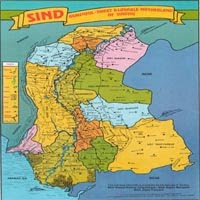
Search This Blog
Monday, January 30, 2012
Thomas Bahler- My Online Friend

Thursday, January 19, 2012
The Sindhi Forbearance

Born to excel and endure, the Sindhi Hindu had been the victim of vagaries of partition of India when Sindh was included lock, stock and barrel in Pakistan on August 14, 1947. Prior to this, the docile and industrious community had borne the brunt of Muslim domination, right from the beginning of the 8th century when Mohammad Bin Quasim first ransacked Sindh and thereafter by repeated onslaughts over the centuries by Muslim marauders culminating in rule or say misrule by Soomras, Sammas, Kalhoras and ultimately by the Mirs who were vanquished by the British in 1843.
The British rule had been a respite from continuous intimidation and cultural deterioration but the gritty Hindu had stood his ground stubbornly. They not only excelled in industry and trade, amassing uncalculated riches but by administrative skill upheld moral values with character and dignity, despite shelling out outrageous extortions through their hard earned money. They were in a way, financiers to the Muslim rulers and later contributed to the British exchequer and were the founders of Sindh Warki cult- The Sindhi traders abroad who were in prominence all over the world.
Inclusion of Sindh with a Hindu minority, in Pakistan was a blessing in disguise as the caged phoenix escaped and triggered the Hindu exodus to India. Thus the community headed for a belated breather and freedom, to honorably make a fresh start. Considering the freedom movement and anticipating as to what was in store for them, the migrants had been well prepared to emigrate safely, sans violence and bloodshed with their liquid assets and embrace new horizons. Now on a safe ground and with a brief and welcome rehabilitation program by the Congress government, the Sindhi merrily set about the resurrection. Reconciled to their lot and minding their own vocation, the community mingled locally with gusto, adopting the doctrine with a cheerful demeanor, to live in India with a distinguished standard and inimitable lifestyle. They politely signaled subservience- the desire to serve, with a theme of liberation that needed rejoicing. So they did not bother to squint in the past and ardently looked to the future. They upheld the dignity of profession, avoiding the ravages of anti social activity with no political and welfare demands whatsoever, while the other communities demanded reservations, subsidies and handouts, in the process resorting to extreme and degenerate means of fasting, picketing, rioting, disobedience, self immolation etc. But no Sir! the Sindhi, though for a while down on his knees and financially depleted, refrained respectfully from resorting to unscrupulous means. On the contrary the Sindhi was appalled by the negative attitude of the rest of citizens of free India in its infancy. In fact, the entire nation should have stood by and shouldered and shared the problems that had been left unattended to by the British.
Withstanding the complexities of life to be lived and cherished optimistically, the Sindhi has scaled mountains and still chases success and dreams, having fun and living every moment of the escapade, being unceasingly hugged by greatness in life. Thus the Sindhi remains miraculously energetic and frantically alive.